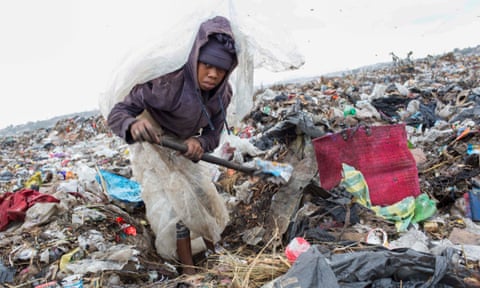Fanja Randriamihavo, 15, is one of 3,000 people who live and work in Ralalitra, one of Africa’s largest rubbish dumps. The site, in Madagascar’s capital, Antananarivo, spans about 50 acres. Each day, it receives more than 600 tonnes of waste from the capital and from the three million residents of its sprawling suburbs.
People who work on the dump site collect metals, coal and plastic from among the chaotic mess of needles, rats, faeces and aborted babies. They are paid just 3,000 Malagasy ariary ( 70p) a day.
Many families take it in turns to work a gruelling 10-hour shift: mothers and children during the day, men at night. Among the many dangers facing families is the plague, which spread to the capital in August. Across the country, around 2,400 cases of the disease have been reported.

Randriamihavo, who sifts through rubbish at Ralalitra during heavy rain, says she doesn’t worry about the plague. “God will protect us,” she says. Asked about the worst thing she has seen in the dump, she replies: “I have come across aborted babies before – sadly it’s not unusual.”
Isabel Rakotomiriana, 40, has been living and working at Ralalitra for more than 15 years. Her sister used to work alongside her, but left the site because she worried about the health of her five children. She now works at a porphyry mine where she earns 1,700 Malagasy ariary (40p) a day.

The site is run by Service Autonome de Maintenance de la Ville d’Antananarivo (Samva), a private company that has a contract with the local authority. Each day, lorries bring heaps of rubbish for people to search through. Samva has been accused of trying to prevent journalists from entering the site to talk to local people. The company did not respond to a request for comment.


Above, workers end a night shift on Ralalitra. There are rumours that a number of people have been run over by lorries after falling asleep on the site during their night shift, although there’s no suggestion that Samva bears any responsibility for this. Two fatalities have been reported by residents in the past two months alone.


Woman sort through metals, coal and plastic before bagging them up to sell.

Dogs sniff through the rubbish during a downpour. While the number of reported cases of the plague has steadily decreased over recent weeks, the World Health Organization has warned that new infections are more likely during the rainy season, which will last until the end of April. Doctors fear Ralalitra could become a breeding ground for the disease.

